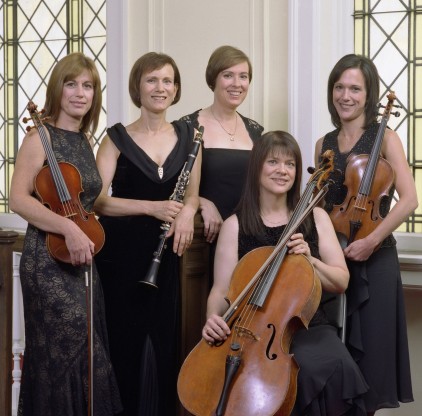Orion Ensemble opens with flavorful semi-Spanish program

With a series of pieces exploring different facets of Spanish music, the Orion Ensemble kicked off its nineteenth season in a delightfully flavorful way Sunday night at the Music Institute of Chicago in Evanston. All musicians were in top form in a fairly adventurous program that ended with an undeniable bang — the combination of Khachaturian’s Clarinet Trio and Gaspar Cassadó’s Piano Trio.
The concert started on a somber note with a dedication to Keith Conant, principal violist of the Lyric Opera Orchestra and a mainstay of the Chicago music scene, who recently passed away from a heart attack at the age of 49. It was also a part of the Daniel Pearl Music Days, which seeks to bridge gaps and create channels of communication through musical performances around the world.
With those dedications in mind, the group opened with the rarely heard Granados Trio for violin, cello and piano. Written in 1910, it’s a deliberate look backwards in time, firmly resisting the modernist undercurrents that were bubbling to the surface in Paris and elsewhere.
It’s perfectly pleasant music, with modal borrowing, occasional trills, and other Spanish inflections seasoning what would otherwise be a sedate tonal landscape. The energy ramped up as the work progressed, with some particularly challenging interludes for piano — Granados’ own instrument — well played by Diana Schmück. For the string players, the difficulty in this music seemed not so much technical, but just being able to float the melody above the piano texture and trade the line back and forth effortlessly, which violinist Florentina Ramniceanu and cellist Judy Stone did with great facility.
Clarinetist Kathryne Pirtle took the stage for Stravinsky’s Three Pieces for Clarinet Solo, which marked her first-ever unaccompanied solo performance with the ensemble. The set of short vignettes by Igor Stravinsky served as a cleansing breath after the Granados. The rounder, more somber character of the A clarinet was featured in the first two movements, which mostly consisted of wending, ruminating melodic lines that highlighted the chalumeau register of the instrument with occasional leaps into the upper range. Pirtle switched to the higher-pitched B-flat clarinet for the finale, playing music that occasionally incorporated distant echoes of klezmer and jazz into Stravinsky’s atonal language.
After a capable rendering of the Vanhal Trio, Op. 20, first movement by young OPUS artists taking part in the Orion Ensemble’s summer training program, energetic trios by Aram Kachaturian and Gaspar Cassadó filled the second half of the program.
Kachaturian’s score opened with Debussy-esque chords in the piano that laid the foundation for an opening violin recitative with flowing ornamentation. The clarinet response at times recalled Rimsky-Korsakov’s Scheherazade, evocative tone painting that paired elegantly with the soloistic violin part. Throughout, the musicians played with a full-bodied tone and sensitivity to each other and the dramatic shape of the music, making this the most compelling performance of the evening.
A composer that studied with Pablo Casals in Paris, Cassadó wrote music that was perhaps the fullest embodiment of the evening’s Spanish theme that ostensibly unified the evening’s works. Vacillating between a celebratory first theme and brooding second, his Piano Trio juxtaposes Shostakovich-like intensity with elaborate Spanish melodies in a deeply powerful and virtuosic way. The Orion Ensemble members played with a fiery passion that was worlds away from the relatively sedate Granados that opened their program, driving with excitement and energy to a rousing conclusion.
The program will be repeated October 5 at Roosevelt University’s Ganz Hall and October 9 at Fox Valley Presbyterian Church in Geneva. orionensemble.org; 630-628-9591.
Posted in Performances




